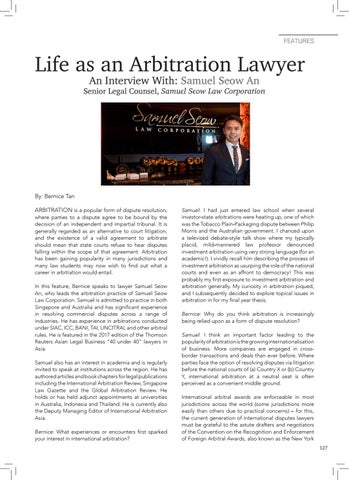FEATURES
Life as an Arbitration Lawyer An Interview With: Samuel Seow An
Senior Legal Counsel, Samuel Seow Law Corporation
By: Bernice Tan ARBITRATION is a popular form of dispute resolution, where parties to a dispute agree to be bound by the decision of an independent and impartial tribunal. It is generally regarded as an alternative to court litigation, and the existence of a valid agreement to arbitrate should mean that state courts refuse to hear disputes falling within the scope of that agreement. Arbitration has been gaining popularity in many jurisdictions and many law students may now wish to find out what a career in arbitration would entail. In this feature, Bernice speaks to lawyer Samuel Seow An, who leads the arbitration practice of Samuel Seow Law Corporation. Samuel is admitted to practice in both Singapore and Australia and has significant experience in resolving commercial disputes across a range of industries. He has experience in arbitrations conducted under SIAC, ICC, BANI, TAI, UNCITRAL and other arbitral rules. He is featured in the 2017 edition of the Thomson Reuters Asian Legal Business “40 under 40” lawyers in Asia. Samuel also has an interest in academia and is regularly invited to speak at institutions across the region. He has authored articles and book chapters for legal publications including the International Arbitration Review, Singapore Law Gazette and the Global Arbitration Review. He holds or has held adjunct appointments at universities in Australia, Indonesia and Thailand. He is currently also the Deputy Managing Editor of International Arbitration Asia. Bernice: What experiences or encounters first sparked your interest in international arbitration?
Samuel: I had just entered law school when several investor-state arbitrations were heating up, one of which was the Tobacco Plain-Packaging dispute between Philip Morris and the Australian government. I chanced upon a televised debate-style talk show where my typically placid, mild-mannered law professor denounced investment arbitration using very strong language (for an academic!). I vividly recall him describing the process of investment arbitration as usurping the role of the national courts and even as an affront to democracy! This was probably my first exposure to investment arbitration and arbitration generally. My curiosity in arbitration piqued, and I subsequently decided to explore topical issues in arbitration in for my final year thesis. Bernice: Why do you think arbitration is increasingly being relied upon as a form of dispute resolution? Samuel: I think an important factor leading to the popularity of arbitration is the growing internationalisation of business. More companies are engaged in crossborder transactions and deals than ever before. Where parties face the option of resolving disputes via litigation before the national courts of (a) Country X or (b) Country Y, international arbitration at a neutral seat is often perceived as a convenient middle ground. International arbitral awards are enforceable in most jurisdictions across the world (some jurisdictions more easily than others due to practical concerns) – for this, the current generation of international disputes lawyers must be grateful to the astute drafters and negotiators of the Convention on the Recognition and Enforcement of Foreign Arbitral Awards, also known as the New York 127
